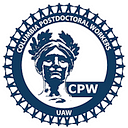Why the Columbia grad workers’ strike makes sense to postdocs
by Medini Annavajhala, PhD and Tulsi Patel, PhD. Medini and Tulsi are both postdoctoral workers at Columbia University and on the Executive Board of Columbia Postdoctoral Workers-UAW Local 4100. Both were previously PhD student workers at Columbia, and organized for Graduate Workers of Columbia-UAW (GWC-UAW).

In February 2019, Columbia Postdoctoral Workers-UAW Local 4100 (CPW) began negotiations with Columbia’s administration along with our union siblings, the Graduate Workers of Columbia-UAW Local 2110 (GWC). In July 2020, after sixteen months of bargaining, we reached an agreement with the university and later ratified the first contract for postdoctoral workers at Columbia, the first of its kind at any private university in the U.S. As of February 25th, two years later, GWC is still left bargaining with Columbia.
Even after two years of negotiations, Columbia is still refusing to put a fair offer on the table for GWC. Their bargaining team has claimed that not all of them deserve the protections of a union contract, that their health benefits do not belong in the contract, and that, unlike us, they do not need access to grievance and arbitration procedures for cases of discrimination and harassment. We witness GWC’s all-too-familiar fight with the university administration and cannot help but ask ourselves: Why is Columbia treating student workers so differently?
Postdoctoral and student workers often work closely alongside each other. We share space, projects, and ideas with graduate research assistants in labs. Together, we bring in millions of dollars in grant funding and propel groundbreaking research. Teaching assistants and student instructors are key to the university’s educational mission, which brings in a tremendous amount of money in tuition and fees. We see their contribution to Columbia and we understand very well why they have gone on strike.
Two years is more than enough time to reach an agreement. Two years of not being responsive on the key priorities of the unit is unacceptable. Two years — added to the years of organizing before they could even get to the bargaining table — explain why 96% of GWC voted to authorize the bargaining committee to call a strike.
We know firsthand that Columbia is capable of reaching a fair agreement, due to the successes of our own contract negotiations:
Our contract established more opportunity for real recourse for discrimination and harassment cases through access to the grievance and arbitration procedure. We do not comprehend how the university can deny the same access to student workers. Cases of harassment and discrimination are massively under-reported in academia at large and at Columbia specifically. Having more options for complainants would be a step in the right direction.
Our contract secured union rights and a union shop, which are crucial in building a strong union. Once again we struggle to see why our colleagues in GWC are denied union shop and some of the most standard union rights. Add to those the university’s refusal to recognize all workers — contrary to our shared Bargaining Framework Agreement — and one can see a clear thread of anti-union sentiment that goes all the way back to when GWC asked for voluntary recognition in December 2014. We were there to witness it first hand as graduate workers at Columbia and GWC organizers, and we hope to see change in the university’s attitude.
Our contract raised the minimum salary from the lowest to the highest in NYC. Before we started bargaining, Columbia postdocs’ compensation minimums were behind those at peer institutions such as Rockefeller University, Memorial Sloan Kettering Cancer Center, and the Icahn School of Medicine at Mount Sinai. Columbia made it possible to bring our minimum salaries above their level in our first contract. More importantly, the administration found resources to do so during the pandemic, which shows that the university is capable of putting a serious economic offer on the table even in the current environment. This also can be demonstrated by the fact that Columbia’s endowment did far better than expected in the pandemic and much better than those of many other universities.
With all these facts in mind, we urge the university to do the right thing. GWC has already secured great protections and benefits in the tentatively agreed articles and Columbia should build on this success to provide its student workers with a fair union contract.
